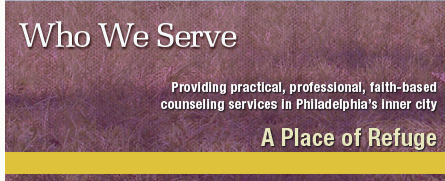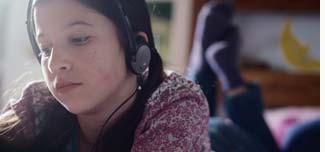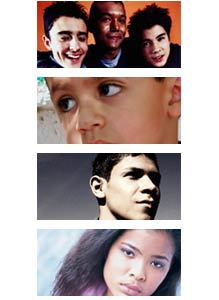 |
 |
 |
 |
 |
 |
The inner-city streets of Philadelphia are filled with hurting people who are desperate for help. A great majority of citizens from minority groups experience deep feelings of inferiority from years of systemic exclusion from the goods enjoyed by mainstream culture. This chronic stress contributes to and underlies the impact of other traumas. In urban northern Philadelphia, more than 40% of the residents subsist at or below poverty level. Many live in broken families and must daily deal with violence, crime, a dangerous drug culture, multi-generational unemployment, and abuse.
According to the statistics, 17% of the people here are unemployed … 21% have no health insurance … and 71% of males and 62% of females do not finish high school. This community holds the fourth highest HIV/AIDS rate in the U.S! But statistics alone do not adequately describe the pervading despair that saturates life here.
“Theresa” is truly a survivor. As a young child, living in a rural setting, her family split, and she was given away to whomever would take her. This involved strangers, friends, and distant relatives. On any given day, she might be moved from one home to another. Her story is a succession of suffering: psychological abuse and unimaginable emotional neglect. Despite this painful history, she managed to bring up children of her own, who now are grown, and raising their own families. But her marriage only lasted for a short time. Most of her young adult life was spent in urban neighborhoods, living below the poverty line, yet she managed as best she could, providing dignity, safety, and meeting her children’s basic daily needs. She never wanted her own childhood story to be repeated with them.
Since most of her childhood years were spent unsupervised with no one to nurture her, she engaged in behavior that left her deeply scarred, with deep feelings of shame. Desperately, she sought help from other local mental health centers, but she says, “It was a waste of time. I never quite developed the level of trust and the mutual respect I needed in those experiences.”
“At Refuge, I feel totally understood and accepted,” she explains.” One day, after a session, Theresa asked me if she could remain in the office for a little while. That little while turned out to be several hours. She tells us that she felt so safe that she just did not want to leave.
In many cases, those fighting for survival do not have the resources or tools to deal with the complex problems they face.
According to Judith Herman, M.D., an author and a leading expert in trauma, “Remembering and telling the truth about terrible events are prerequisites both for the restoration of the social order and for the healing of individual victims.” Trauma is one of the most formidable barriers to producing and maintaining healthy, engaged citizens capable of making quality contributions to society.
Social services offered in these communities are often not of a high professional quality due to poor funding, high caseloads, turnover, and burnout. Many people here simply do not trust the services that are available. Refuge’s model incorporates a common-sense approach to counseling—integrating existing professional counseling models and a faith-component capable of reaching people in truly meaningful ways.
Caregivers, pastors and lay leaders in Philadelphia are hungry for training and resources to help the hurting. We are joining hands with professionals from across the city to help. Through the years, the leaders of The Place of Refuge have developed a unique kinship with pastoral leaders enabling them to enter into the suffering of many lives in their communities. We provide support groups, educational seminars, a lay-counseling training program, and mentoring for over-worked and weary social service professionals and urban pastors. The target service area for The Place of Refuge is North Philadelphia, but already we are seeing that our clients are coming from all corners of the city, predominantly among the Hispanic population. We believe that faith-based work carried out in partnership with local people can unite the professional and grass-root leaders for high-quality services that give help, healing and hope to the hurting.
Permission was obtained, and names and some details changed to protect confidentiality.
Maria was tormented by death. The despair surrounded her like a dark cloud. Death had taken away everyone she loved -- parents, aunts, uncles, best friend, co-workers -- even her pastor!
She cried many tears and the depression and loneliness sapped her very soul. Maria tried to fill the void with excessive shopping sprees. But instead of satisfaction, it only brought her financial disaster. The emptiness was too great, she thought. There was nothing left to live for --
Maria believed that death was the only relief for such unbearable pain. Suicidal thoughts so consumed her that by the time a local pastor referred Maria to The Place of Refuge, she had already tried to take her life twice by overdosing on medication.
We offered Maria professional and culturally sensitive counseling to address her clinical depression, grief and emotional needs. We partnered with her local church to assist them in giving appropriate help and nurture to Maria during this time of turmoil.
Week by week, month by month -- over the course of two years -- Maria’s focus gradually began to shift from her losses to her future. Today, her tears have all been wiped away. Maria says she no longer lives her life in the cloud of hopelessness and despair, but sees how God protected her in the midst of her dark depression and suicidal condition. She said, “God held on to me even when I did not want to be held on to -- in the midst of that darkness I did not want to see His Light."
All the effort and work was worth it and a life has been transformed. That is what The Place of Refuge is all about -- ministering to underserved urban people with professional counseling services and partnering with local churches to help them better support and care for those in their community.
"I would have a very difficult time identifying the one thing that you have done that has helped me the most. My childhood was plagued with harm and hurt, my adulthood is not. You have helped me acknowledge and accept the truth of both. While the abuse is gone, the effects linger. And I am learning to accept that as well. I believe you understand just how radical of a change these things are. But beyond all that was (and is) the sure certainty that you have always led me back to the Father.
The gift you give is that in the midst of your words and care, I find safety. And slowly begin to discover God who, at first is in the midst of your safety and then I realize, is the safety. In that discovery is a memory that I … am royal. The fog and confusion are not part of the abuse, but rather part of the protection. They are no longer needed in the light of safety. It is a gift to see that I am royal, a child of the Great King, a daughter of the Everlasting Father -- a Father who is good."
|

|
|
|
|
|
|